【范文】五年级下册英语第一单元知识点整理
五下英语第一单元课文 主要考点

五下英语第一单元课文主要考点英文回答:The first unit of the fifth grade English textbook focuses on the theme of "Our Changing World" and explores topics related to technology, transportation, and the environment. Key concepts and skills covered in this unit include:Vocabulary related to technology and inventions, such as "computer," "smartphone," and "internet."Understanding the evolution of transportation, from early forms like horse-drawn carriages to modern high-speed trains and airplanes.Exploring environmental issues such as pollution, climate change, and the importance of conservation.Developing reading comprehension skills throughengaging stories and informational texts.Improving oral communication through class discussions, presentations, and role-playing activities.Enhancing writing skills through creative writing, summaries, and reports.中文回答:五下英语第一单元课文主要围绕"我们变化的世界"主题,探讨与科技、交通和环境相关的话题。
(完整版)人教版五年级英语下册Unit1知识点汇总

Unit1 My day 知识整理△话题:谈论每天的活动及时间安排△词汇:do morning exercises(做早操)eat breakfast/lunch/dinner(吃早餐/午餐/晚餐)have...class(上…课),play sports(做运动)clean my room(打扫我的房间),go for a walk (散步) go shopping(购物),take a dancing class(上舞蹈课)△拓展词汇:get up(起床), go to bed(上床睡觉)wash my clothes(洗我的衣服), watch TV(看电视)do homework(做作业), play music(演奏音乐)cook dinner(煮晚餐), at home(在家)in the morning(在上午),in the afternoon(在下午)in the evening(在晚上),at night(在半夜)△句型:①询问做某事在几点When do you+动词原形(短语)+其他?—— At +时间—— I(+频度副词)+动词原形(短语)+at+时间。
例句:When do you get up in the morning?—— At 7:30.—— I often get up at 7:30.②询问周末的活动安排What do you often do on the weekend?I often (always/sometime/usually) +…(周末的活动)+with … (某人)+on the weekend (on Saturdays/on Sundays ).例句:What do you do on the weekend ?I often take a dancing class with my friend on Sundays. △知识点:1:注意介词的搭配at +具体时间(几点)/night/home at 9 o ’clock in +国家/季节 in Spainon +星期 on the weekend/on Sundays with +人 with my father/mother/friend 2:表示时间频率词的区别always 表示总是,一直;usually 表示经常,通常;often 表示经常,常常;sometimes 表示有时,间或。
人教精通版五年级下册英语第一单元笔记
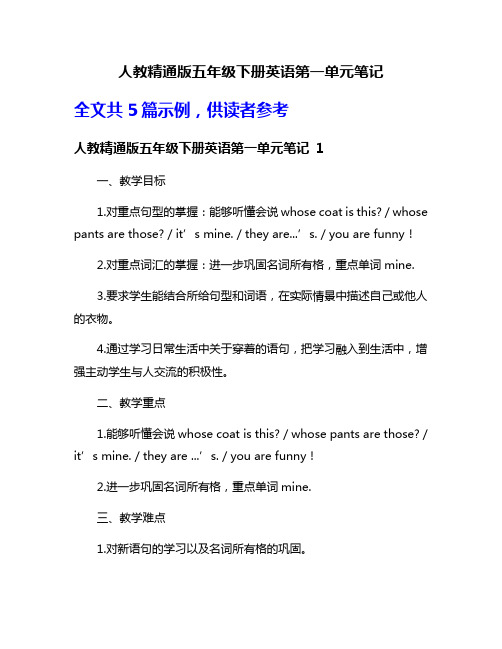
人教精通版五年级下册英语第一单元笔记全文共5篇示例,供读者参考人教精通版五年级下册英语第一单元笔记1一、教学目标1.对重点句型的掌握:能够听懂会说whose coat is this? / whose pants are those? / it’s mine. / they are...’s. / you are funny!2.对重点词汇的掌握:进一步巩固名词所有格,重点单词mine.3.要求学生能结合所给句型和词语,在实际情景中描述自己或他人的衣物。
4.通过学习日常生活中关于穿着的语句,把学习融入到生活中,增强主动学生与人交流的积极性。
二、教学重点1.能够听懂会说whose coat is this? / whose pants are those? / it’s mine. / they are ...’s. / you are funny!2.进一步巩固名词所有格,重点单词mine.三、教学难点1.对新语句的学习以及名词所有格的巩固。
2.学生能结合所给句型和词语,在实际情景中描述自己或他人的衣物。
四、教学准备1.扮演角色所用头饰,单词卡。
2.与教材相配的课件。
五、教学过程step 1. warm-up1. let’s review教师呈现图片,让学生记忆图片上的衣服,记忆上节课所学词汇。
t: do you remember these clothes? s: yes!dress,skirt,...2. let’s say找几位同学描述一下自己的衣服。
(例如:a yellow shirt and black pants)设计意图:简单的热身交流,并复习上节课内容,提高学生兴趣,使学生进入上课状态。
step 2. presentation1. let’s learn教师随机指一位学生a的t恤并对他提问,is this yours?学生回答,yes,it is.然后问全班同学whose t-shirt is this?其他学生回答it’s a’s.并引导a同学回答it’s mine.帮助同学理解mine的含义。
完整版)陕旅版五年级下册英语知识点总结
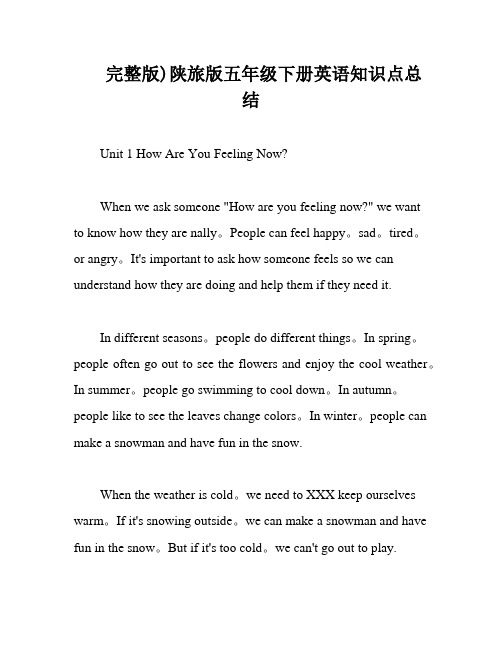
完整版)陕旅版五年级下册英语知识点总结Unit 1 How Are You Feeling Now?When we ask someone "How are you feeling now?" we wantto know how they are nally。
People can feel happy。
sad。
tired。
or angry。
It's important to ask how someone feels so we can understand how they are doing and help them if they need it.In different seasons。
people do different things。
In spring。
people often go out to see the flowers and enjoy the cool weather。
In summer。
people go swimming to cool down。
In autumn。
people like to see the leaves change colors。
In winter。
people can make a snowman and have fun in the snow.When the weather is cold。
we need to XXX keep ourselves warm。
If it's snowing outside。
we can make a snowman and have fun in the snow。
But if it's too cold。
we can't go out to play.If someone looks sad。
we should ask them why and try to help them feel better。
五年级下册英语第一单元整理归纳
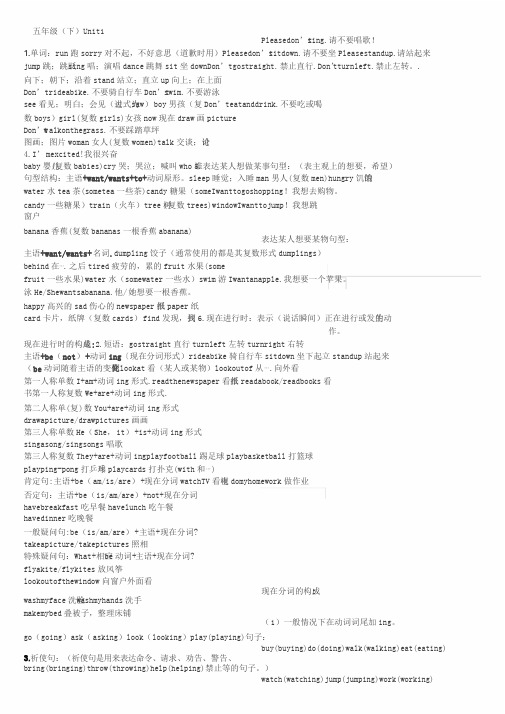
五年级(下)Unit1Pleasedon’s t ing.请不要唱歌!1.单词:run跑sorry对不起,不好意思(道歉时用)Pleasedon’s t itdown.请不要坐Pleasestandup.请站起来jump跳;跳跃s ing唱;演唱dance跳舞sit坐downDon’t gostraight.禁止直行.Don’tturnleft.禁止左转。
.向下;朝下;沿着stand站立;直立up向上;在上面Don’t rideabike.不要骑自行车Don’s twim.不要游泳s aw)boy男孩(复Don’t eatanddrink.不要吃或喝see看见;明白;会见(过去式为数boys)girl(复数girls)女孩now现在draw画pictureDon’w t alkonthegrass.不要踩踏草坪论图画;图片woman女人(复数women)talk交谈;讨4.I’mexcited!我很兴奋5.表达某人想做某事句型:(表主观上的想要,希望)baby婴儿(复数babies)cry哭;哭泣;喊叫who谁的句型结构:主语+want/wants+to+动词原形。
sleep睡觉;入睡man男人(复数men)hungry饥饿water水tea茶(sometea一些茶)candy糖果(someIwanttogoshopping!我想去购物。
candy一些糖果)train(火车)tree树(复数trees)windowIwanttojump!我想跳窗户banana香蕉(复数bananas一根香蕉abanana)表达某人想要某物句型:主语+want/wants+名词.dumpling饺子(通常使用的都是其复数形式dumplings)behind在⋯.之后tired疲劳的,累的fruit水果(somefruit一些水果)water水(somewater一些水)swim游Iwantanapple.我想要一个苹果。
五年级英语下册1-4单元知识点汇总

五年级英语下册1-4单元知识点汇总**Unit 1: Our School****Vocabulary:*** classroom: 教室 * library: 图书馆 * playground: 操场* canteen: 食堂 * office: 办公室 * teacher's desk: 讲台 * computer room: 电脑室 * art room: 美术室 * music room: 音乐室**Sentences:*** This is our school. 这是我们的学校。
* Our school has a big playground. 我们的学校有一个大操场。
* We have many books in our library. 我们的图书馆里有很多书。
* The teachers work in the office. 老师们在办公室工作。
**Grammar:*** Use "has" or "have" to describe possession. 使用“has”或“have”来描述所属关系。
* Use "our" to refer to possession of the group. 使用“our”来指代群体的所属。
**Unit 2: My Family****Vocabulary:*** family: 家庭 * father: 父亲 * mother: 母亲 * brother: 兄弟 * sister: 姐妹 * grandparent: 祖父母 * uncle: 叔叔 * aunt: 阿姨**Sentences:*** This is my family. 这是我的家庭。
* I have a happy family. 我有一个幸福的家庭。
* My father is a doctor. 我的父亲是一名医生。
五年级下册英语第一单元知识点整1
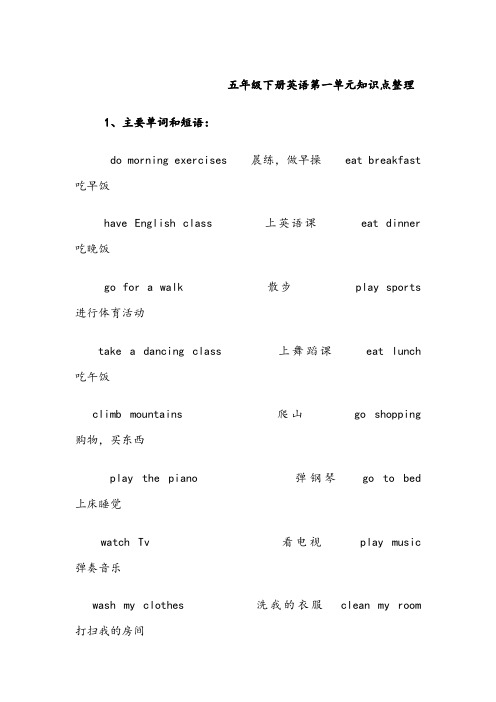
五年级下册英语第一单元知识点整理1、主要单词和短语:do morning exercises 晨练,做早操 eat breakfast吃早饭have English class 上英语课eat dinner 吃晚饭go for a walk 散步 play sports进行体育活动take a dancing class 上舞蹈课eat lunch 吃午饭climb mountains 爬山go shopping购物,买东西play the piano 弹钢琴go to bed 上床睡觉watch Tv 看电视play music 弹奏音乐wash my clothes 洗我的衣服clean my room 打扫我的房间on the weekend 在周末二、主要句子:When do you eat dinner 你什么时候吃晚饭I eat dinner at 7:00 in the evening. 我晚上七点吃晚饭。
When do you get up 你什么时候起床I usually get up at 12:00 at noon. 我通常在中午12点起床。
What do you do on the weekend 你在周末干什么Usually I watch TV and go shopping. 我通常看电视和购物。
Sometimes I visit my grandparents. 有时候我去看望我的外祖父母。
I often play football. 我经常踢足球。
Sometimes I go hiking. 有时候我去远足。
三、重要知识点表示频度的副词:always 总是,一直;usually 通常,常常;often 经常; sometimes 有时候频率副词通常用在主语之后动词之前有时放句首表强调Usually I watch TV and go shopping. 我通常看电视和购物。
五年级下册第一单元英语知识点
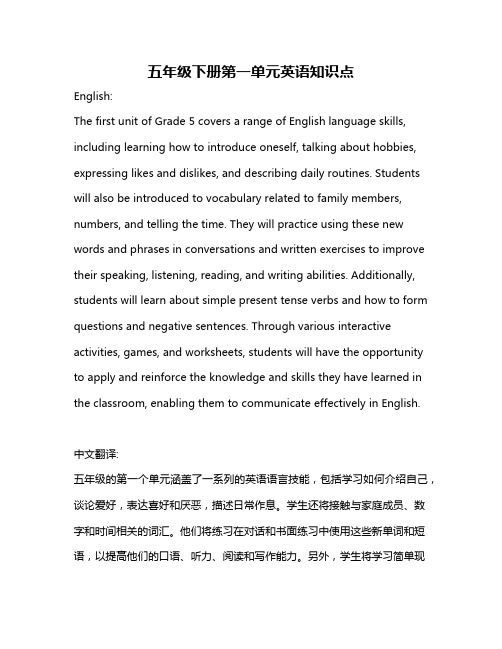
五年级下册第一单元英语知识点English:The first unit of Grade 5 covers a range of English language skills, including learning how to introduce oneself, talking about hobbies, expressing likes and dislikes, and describing daily routines. Students will also be introduced to vocabulary related to family members, numbers, and telling the time. They will practice using these new words and phrases in conversations and written exercises to improve their speaking, listening, reading, and writing abilities. Additionally, students will learn about simple present tense verbs and how to form questions and negative sentences. Through various interactive activities, games, and worksheets, students will have the opportunity to apply and reinforce the knowledge and skills they have learned in the classroom, enabling them to communicate effectively in English.中文翻译:五年级的第一个单元涵盖了一系列的英语语言技能,包括学习如何介绍自己,谈论爱好,表达喜好和厌恶,描述日常作息。
- 1、下载文档前请自行甄别文档内容的完整性,平台不提供额外的编辑、内容补充、找答案等附加服务。
- 2、"仅部分预览"的文档,不可在线预览部分如存在完整性等问题,可反馈申请退款(可完整预览的文档不适用该条件!)。
- 3、如文档侵犯您的权益,请联系客服反馈,我们会尽快为您处理(人工客服工作时间:9:00-18:30)。
五年级下册英语第一单元知识点整理
1、主要单词和短语:
domorningexercises
晨练,做早操
eatbreakfast
吃早饭
haveEnglishclass
上英语课
eatdinner
吃晚饭
playsports
进行体育活动
eatlunch
吃午饭
climbmountains
爬山
goshopping
购物,买东西
playthepiano
弹钢琴
visitgrandparents
看望(外)祖父母
gohiking
去远足
二、主要句子:whendoyoueatdinner?
你什么时候吃晚饭?
Ieatdinnerat7:00intheevening. 我晚上七点吃晚饭。
whendoyougetup?
你什么时候起床?
Iusuallygetupat12:00atnoon.
我通常在中午12点起床。
whatdoyoudoontheweekend?
你在周末干什么?UsuallyIwatchTVandgoshopping. 我通常看电视和购物。
SometimesIvisitmygrandparents. 有时候我去看望我的外祖父母。
Ioftenplayfootball.
我经常踢足球。
SometimesIgohiking.
有时候我去远足。
三、重要知识点
同义词:
eatbreakfast-havebreakfast,
eatlunch-havelunch,
eatdinner-havedinner playsports-dosports,
usually-often
复数形式:policeman-policemen
policewoman-policewomen
现在分词:tell-telling
第三人称单数:say-says
同义句:whatdoyoudo?---whatareyou?你是干什么的?
表示频度的副词:always总是,一直;usually通常,常常;often经常;sometimes有时候
以复数形式出现的词组:visitgrandparents,planttrees
介词后跟表示时间的词语时,表示在某年、某月、某个季节,某个时候(在上午,在下午,在晚上)用in;表示在某一天,在星期几用on,在具体的几点几分用at.
too和either的用法区别:too和either都是“也”的意思,但too用于肯定句,either用于否定句。
